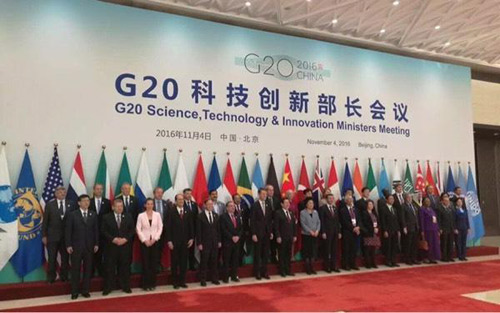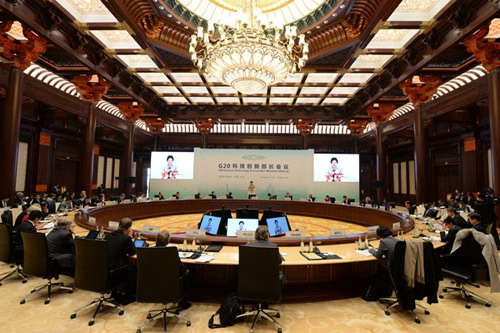

The G20 Science, Technology and Innovation Ministers Meeting was held in Beijing on November 4, 2016. Representatives from the G20 member states, six invited countries as well as international organizations gathered in Beijing to discuss how to advance global cooperation on science, technology and innovation.
The 2016 G20 Leaders Summit, concluded in Hangzhou two months ago, released the G20 Leaders‘Communique Hangzhou Summit, G20 Blueprint on Innovative Growth and G20 Innovation Action Plan. For the first time, the Summit listed“Innovative Growth” as one of the key subjects of the G20. The ministers meeting was the first action to follow up on the”Innovative Growth” after the G20 Hangzhou Summit, and was also the first of its kind under the G20 framework. Chinese Vice Premier Liu Yandong attended and addressed the opening ceremony. The ministers and guests discussed a wide range of topics about the policies and practices on innovation-driven growth, innovation and entrepreneurship, priority areas and modalities of STI cooperation, and science and technology human resources and innovation talents. A number of agreements were reached at the meeting.
A statement was released at the G20 Science, Technology and Innovation Ministers Meeting. Wan Gang, Chinese Minister of Science and Technology, said the statement underscored the important role of innovation in driving global economic growth, pushing sustainable development and bolstering dialogue and cooperation. In addition, it expressed the will to take concerted actions in implementing policies and practices related to the innovation-driven growth, pursuing innovation & entrepreneurship, exploring the priority areas and models of cooperation in science, technology and innovation, S&T talent resources and innovation talent exchange.
The meeting agreed that innovation is one of the key driving forces of long-term economic growth, and stressed that member countries should try to develop new engines to spur economic growth, create job opportunities and figure out a fundamental solution to the global sluggish economy. The meeting reiterated the important role of the G20 task force on innovation, pledged to keep advancing the G20 mandates in innovation, new industrial revolution and digital economy and ensure continuity and consistency at future G20 presidencies, and join forces with other G20 working streams with the support of OECD and other international organizations. The meeting voiced support for innovation dialogue and cooperation across a wide spectrum of areas and the sharing of best practices and policies among G20 countries, called for developing an online exchange community, sharing innovation policies, measures and best practices, supported the publication of 2016 G20 Innovation Report by OECD, encouraged G20 members to form synergy among national innovation systems, and helped developing countries to strengthen their capacity in science, technology and innovation and build their own innovation ecosystems.
The participants encouraged mass entrepreneurship and innovation, supported creativity and innovation, and backed the development of innovation-friendly ecosystem. They also encouraged cross-border S&T investment, entrepreneurship and innovation to grow the economy and create jobs, supported the establishment of open and transparent systems that offer a level playing field for all players with a predictable, reasonable and reliable regulatory regime, and promoted communication and cooperation between innovation clusters and science parks.
The participants stressed the great importance of investment into fundamental science, welcomed the opening of the G20 Business Innovation Forum, encouraged the establishment of public-private partnership in science, technology and innovation, and backed the business sector to push G20 members to develop public-private partnership and business collaborations.
The meeting reaffirmed that human resources are the most critical factor to pursue scientific and technological development, supported mobility of science, technology and innovation talents to address future demand for skilled talents and help the underprivileged people and other labors to adapt to changes brought by new technologies, supported the sharing of the best practices in STEM education and innovation & entrepreneurship training and tutoring, highlighted the important roles played by youth and women in innovation and entrepreneurship, agreed to strengthen talent exchange and cooperation, backed the establishment of “G20 Young Entrepreneur & Innovation Partnership” and encouraged more cooperation in business incubators, maker spaces and business startups.

